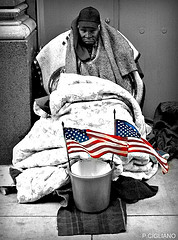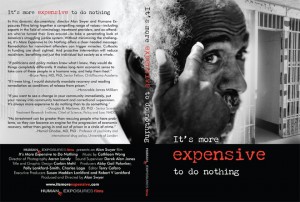Coming to Chicago in September and October Roosevelt University, in conjunction with the Mansfield Institute for Social Justice and Transformation, will be kicking off a fascinating and educational series of discussions centered around the topic of youth detention and incarceration.
It all starts on the 26th of September with a volley of personal narratives. Those of you who follow our work already know the importance we attach to these personal stories. They are the most effective way to re-humanize those on the borders of society. It is a lot harder to ignore a statistic once you’ve met the person represented by the numbers.
While none of our team will be able to make it to the Windy City, we do encourage any of you within range to do so. It looks like quite an array of programming!
So, without further ado, here is their writeup on what you can expect. If any of you, our readers, make it to the series, we would love to hear about the experience!
Youth stories on their experiences in confinement
Learn from youth about what life in confinement is like and how this experience, and other levels of connection with the juvenile justice system, has impacted their lives.
Wednesday, September 26, 5:30 p.m.Chain reaction: Alternatives to policing
Listen to youth tell stories of their encounters with the police, and then join the dialogues about alternatives to policing as a way to reduce violence and crime.
Thursday, October 4, 5:30 p.m.Alternatives to juvenile detention and incarceration: Can we succeed? What will it take?
What community-based alternatives exist now? How are youth referred to these programs? Are they designed to educate, rehabilitate and address the needs of youth who have drug dependencies, disabilities, mental health or trauma issues? Are there enough housing facilities and programs available to youths with criminal records?
Tuesday, October 23, 5:30 p.m.Youth with disabilities need education, not incarceration
Youth with disabilities comprise 30 to 80 percent of youth caught up in the juvenile justice system. How can we ensure youth are getting the services they need to succeed in school and beyond?
Thursday, November 8, 5:30 p.m.Reentry and life after juvenile confinement: Existing services, or lack thereof, to ensure a successful transition and no recidivism
What services are available to youth when they are released? Is there adequate support for them to complete their education, receive expungement guidance, housing, counseling and other necessary services to ensure they are successful and don’t recidivate? Tuesday, December 4, 5:30 p.m.
RSVP: Nancy Michaels, nmichaels@roosevelt.edu
Cosponsored with Project NIA
Related articles
- A Conscious Chicagoan’s Guide to Youth Detention and Incarceration (chiyouthjustice.wordpress.com)
- LIttle Girls in Solitary (humaneexposures.com)
- NSW juvenile detention tops 400 per day (smh.com.au)
- Feds: Mississippi county runs ‘school-to-prison pipeline’ (cnn.com)
- Mississippi – A shocking disregard for the rights of African-American and disabled kids (humaneexposures.com)


 It is a fact of the modern, media-driven mentality that celebrities attract a lot of attention. This is frequently leveraged, where possible, to attract attention to causes of various sorts. Back in my home town of New Orleans, Brad Pitt is the resident champion of sustainable housing. Jerry Lewis has his famous telethon; Oprah consistently casts her spotlight on social issues, and so on.
It is a fact of the modern, media-driven mentality that celebrities attract a lot of attention. This is frequently leveraged, where possible, to attract attention to causes of various sorts. Back in my home town of New Orleans, Brad Pitt is the resident champion of sustainable housing. Jerry Lewis has his famous telethon; Oprah consistently casts her spotlight on social issues, and so on. San Diego’s yearly Stand Down event just passed recently, hosted by one of the oldest and most well-known programs to help homeless veterans. In case you’re not familiar with it,
San Diego’s yearly Stand Down event just passed recently, hosted by one of the oldest and most well-known programs to help homeless veterans. In case you’re not familiar with it, 
 We cover a lot of prison issues on this blog. However, up till now, we’ve yet to touch on one of the most infamous prisons in modern American history — Guantanamo.
We cover a lot of prison issues on this blog. However, up till now, we’ve yet to touch on one of the most infamous prisons in modern American history — Guantanamo. As part of its Third Wednesday Series, the
As part of its Third Wednesday Series, the  The Newburyport Documentary Film Festival, now in its third year, presents 20 films. Three judges will rate the films in a number of juried categories, and, in addition, an audience-adjudicated award will also be given.
The Newburyport Documentary Film Festival, now in its third year, presents 20 films. Three judges will rate the films in a number of juried categories, and, in addition, an audience-adjudicated award will also be given.







